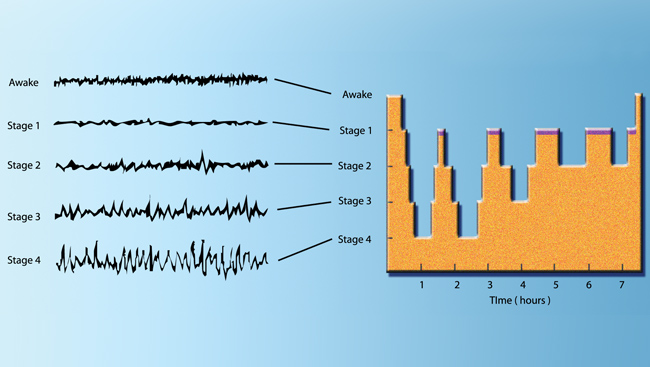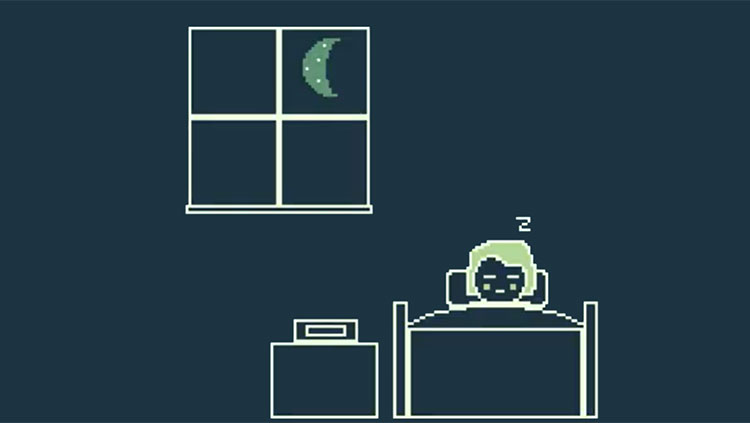The Secret to Memory? A Good Night’s Sleep
- Published3 Mar 2015
- Reviewed3 Mar 2015
- Author Susan Gaidos
- Source BrainFacts/SfN
Have you ever stayed up all night to study for a test? Or sacrificed sleep to review talking points for a presentation? We’ve all been there. But a growing body of research suggests that your best bet is to sleep on it. That's because sleep helps strengthen memories you've formed throughout the day, and links new memories to older ones. Some findings suggest that sleep can do more than strengthen memories: it might even help with problem solving and creative insight.

While You Were Sleeping
Everybody knows that rest is good for the body, and over the years, researchers have found evidence that sleep is good for learning and memory, too.
The first reports of sleep’s positive effect on memory date back to 1924, when researchers taught people nonsense syllables and tested them hours later. Subjects who got some shut-eye before testing were better at remembering than those who had stayed awake. In 1973, scientists found that people were better at recalling newly-learned word-pairs if they had slept during the first half of the night.
Other studies have shown that getting a full eight hours of sleep after learning a new task, such as a finger-tapping exercise, or after studying a long list of words can boost recall the next day. Even a one-hour nap can improve performance on certain tasks.
But figuring out how sleep enhances memory isn’t easy. While you snooze, nerve cells in the brain continue to fire electrical signals. They fire in distinct patterns that mark the various stages of sleep including light sleep, deep sleep, and rapid eye movement (REM) sleep, a phase when dreaming often occurs. The brain cycles through these phases during the night. Over the years, researchers have found ways to test how sleep strengthens memories, by systematically interfering with these sleep stages, or by “listening in” on neural activity in the sleeping brain.
Play It Again, Brain
When you nod off at night, your brain “replays” the day’s events. During these nightly recaps, brain regions essential for making and storing memories, namely the hippocampus and the neocortex, “talk” to one another.
Evidence that the sleeping brain replays recent experiences dates back to the 1980s and 1990s when neuroscientists recorded the electrical activity of neurons called “place cells” in the rat hippocampus both during sleep and while the animals were awake. As a rat ran around a maze, the neurons fired in a specific sequence, corresponding to specific locations in the maze. Later, as the rat dozed, the sequence replayed in their brain, as if the animal was retracing its steps.
Studies using electroencephalography (EEG) to examine the human brain show that people experience something similar when they sleep. Activity in the hippocampus revs up when people slip into a deep, dreamless stage called slow-wave sleep. During this sleep stage, the hippocampus fires signals to the neocortex, relaying the day's sensory impressions.
Scientists believe this pillow-talk is the brain’s way of transferring memories from temporary storage in the hippocampus to long-term storage in the neocortex, a process called consolidation, says Matthew Walker, a neuroscientist at the University of California, Berkeley who has studied sleep for more than a decade.
EEG studies also show waves of electrical activity throughout the brain that peak about once a second. These slow-moving waves are thought to alter the strengths of the connections, or synapses, between nerve cells. Most scientists believe that synaptic changes, which result from initial learning and from sleep, lie at the heart of memory.
Recently, scientists at New York University School of Medicine and Peking University Shenzhen Graduate School have demonstrated that sleep supports the formation of new synapses. After training mice to walk on top of a rotating rod, the researchers let some of the mice sleep for seven hours while the rest were kept awake. Both groups of animals had more synapses in the motor cortex after training, but the sleep-deprived mice had fewer new synapses than the mice that were allowed to sleep.
Bedtime Insights
In addition to strengthening memories, sleep can also help integrate new information, leading to creative insight. In one experiment, researchers at the University of California, San Diego showed how sleep restructures information to help subjects see new patterns, linking new information with prior knowledge. Scientists gave subjects sets of three words and asked them to come up with a fourth word that links to the others. Tests were administered in early morning and at the end of the day. Between tests, some subjects got a nap, which included REM sleep. Others napped only briefly or rested quietly. When retested, subjects who spent time in REM sleep were better at coming up with new or creative word associations.
Walker says sleep is an ideal time for the "undistracted" brain to link new information to related memories. When awake during the day, the brain seeks out obvious connections, things that seem to go together. But sleep gives the brain time to find and build more distant associations that can ultimately lead to the inspiration of creativity.
“It’s perhaps no surprise that you have never been told you to stay awake on a problem,” Walker says. “We know that you should sleep on it, and we now have empirical scientific evidence that sleep serves this creative, associative process.”
While the connection between sleep and memory is clear, scientists are still learning how sleep exerts its beneficial effects in the brain and within individual neurons. In addition, researchers are still exploring sleep’s role in learning and creative insight. And researchers have yet to fully figure out the impact of chronic sleep loss on memory, or to facilitate ways to help body and mind recover from sleep loss. Many questions remain unanswered, but with further study — and a good night’s sleep — scientists are learning more about the relationship between sleep and memory.
CONTENT PROVIDED BY
BrainFacts/SfN
References
Gujar N, Yoo SS, Hu P, Walker MP. The unrested resting brain: sleep deprivation alters activity within the default-mode network. Journal of Cognitive Neuroscience. 22(8):1637-48 (2010).
Mander BA, Rao V, Lu B, Saletin JM, Lindquist JR, et al. Prefrontal atrophy, disrupted NREM slow waves and impaired hippocampal-dependent memory in aging. Nature Neuroscience. 16(3):357-64 (2013).
Pavlides C, Winson J. Influences of hippocampal place cell firing in the awake state on the activity of these cells during subsequent sleep episodes. The Journal of Neuroscience. 9(8): 2907-2918 (1989).
Wilhelm I, Diekelmann S, Molzow I, Ayoub A, Mölle M, et al. Sleep selectively enhances memory expected to be of future relevance. The Journal of Neuroscience. 31(5):1563-9 (2011).
Wilson MA, McNaughton BL. Reactivation of hippocampal ensemble memories during sleep. Science. (5172):676-9 (1994).
Yang G, Lai CS, Cichon J, Ma L, Li W, et al. Sleep promotes branch-specific formation of dendritic spines after learning. Science. 344(6188):1173-8 (2014).
Also In Sleep
Trending
Popular articles on BrainFacts.org

















